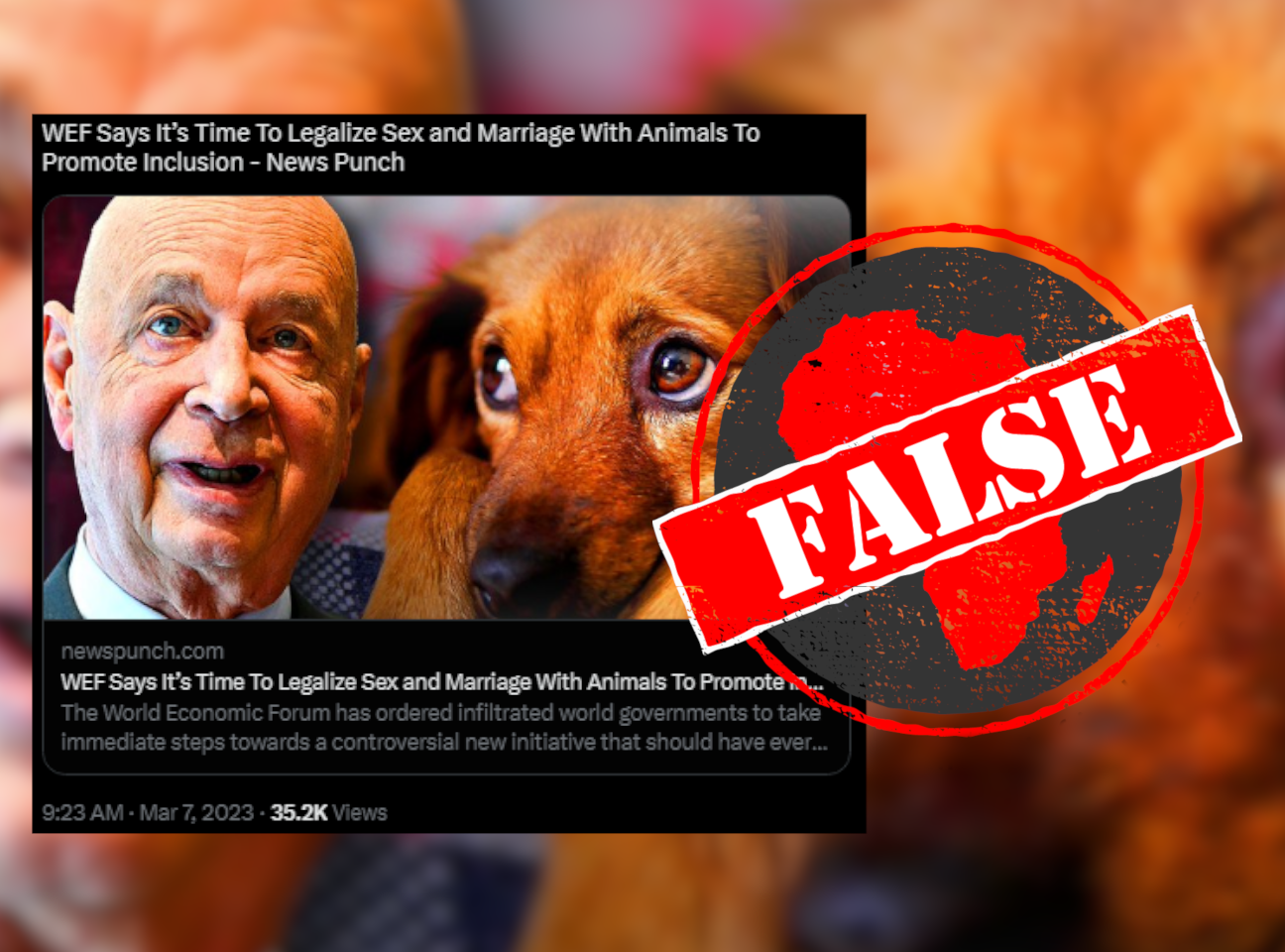IN SHORT: There’s no evidence the WEF has made any kind of pronouncement on the legality of sex between people and animals. It doesn’t have the “authority or intention” to do so, the organisation says.
The World Economic Forum “Says It’s Time To Legalize Sex and Marriage With Animals To Promote Inclusion”, according to a series of posts circulating on social media in March 2023.
Versions of the claim appeared on Twitter, here, here, here, here and here, and on Facebook, here, here, here, here, here and here. Some of the posts have received tens of thousands of views.
The claim also appeared on other sites, like here and here. Many of the claims link to an article posted to News Punch, a site known to publish false information.
The World Economic Forum, or WEF, is an international non-governmental organisation based in Switzerland. The organisation says its aim is to strengthen collaboration between the public and private sectors to “shape global, regional and industry agendas”.
The organisation has been at the centre of conspiracy theories before and is regularly the target of NewsPunch articles. Africa Check has previously debunked some of these, like here, here and here.
And as with previous rumours peddled by News Punch, this claim is also false.

‘This is a fake story’ – WEF spokesperson
Fact-checking organisation Snopes contacted the WEF about the claim. Yann Zopf, a spokesperson for the organisation, refuted the article, saying: “This is a fake story that aims to discredit the important work that the World Economic Forum does on serious global challenges. The World Economic Forum never made such claims”.
He went on to say that the organisation “has no authority and also no intention to give orders to governments and other institutions or individuals”.
Claim compares gender diversity with bestiality
According to the News Punch article headline, the WEF’s intention with legalising sex with and marriage to animals is to “promote diversity and inclusion”.
The article’s target appears to be LGBTQ rights, in particular transgender rights – “according to the global elite, zoophiles are just another spectrum on the trans pride flag” – though this isn’t very directly expressed. Elsewhere on their website, NewsPunch says “zoophiles” are people who “believe it’s acceptable to be sexually intimate with an animal”.
This comparison appears to be linked to the repeatedly debunked idea that school children have been permitted or encouraged to self-identify as animals, which is often used as a slippery slope argument against transgender rights. One Facebook user, after making the claim about legalising bestiality, wrote: “How 'bout all that garbage of letting kids in school ‘Identify’ as animals. Blurring the lines. WAAAAAKE UP”.
The NewsPunch article and social media users imply that there is some kind of logical progression from generally accepting gender and sexual diversity to allowing children to identify as animals, and accepting people having sex with or getting married to animals.
“This is no longer a slippery slope. We are in free fall off a cliff”, the article says, implying that bestiality is the inevitable outcome of acknowledging diversity in how people identify in terms of gender.
There is no evidence that the WEF has said sex with or marriage to animals should be legalised, and the claim has been refuted by the organisation. The claim comes from a known misinformation website and is false.
Republish our content for free
For publishers: what to do if your post is rated false
A fact-checker has rated your Facebook or Instagram post as “false”, “altered”, “partly false” or “missing context”. This could have serious consequences. What do you do?
Click on our guide for the steps you should follow.
Publishers guideAfrica Check teams up with Facebook
Africa Check is a partner in Meta's third-party fact-checking programme to help stop the spread of false information on social media.
The content we rate as “false” will be downgraded on Facebook and Instagram. This means fewer people will see it.
You can also help identify false information on Facebook. This guide explains how.


Add new comment